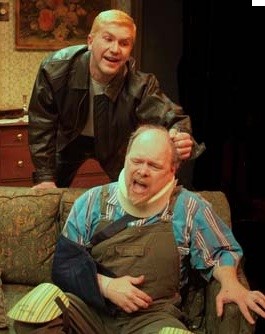Joe Orton's Entertaining Mr. Sloane at the Germinal
Remembering the Days Before Stonewall
By: Susan Hall - Feb 25, 2012
Entertaining Mr. Sloane
By Joe Orton
Directed and Designed by Stephen R. Kramer
Costumes by Sallie Diamond
Cast: Pamela Clifton (Kath), Seth Palmer Harris (Sloane), Randy Diamon (Dada), Augustus Truhn (Ed).
Germinal Stage Denver
February 24, 2012
Performances continue through March 10, 2012
Germinal Stage Denver was formed by four local actors almost forty years ago. Their mission: to present plays whose performance is followed by a germinal silence “in which you can hear the very seeds in the human psyche stirring, trying to move toward the light of self recognition.”
Their success is marked by strong productions, many awards, local and national, and funding from individuals to the National Endowment for the Arts. Like TimeLine in Chicago, they are committed to presenting important plays on a fiscally sound basis.
Joe Orton reminds us of the misunderstanding, downright cruelty and primitive fear that homosexuality once roused. With Maryland joining six other states and D.C. to make same sex marriage legal, we can forget a time when the basic act of homosexual sex was banned by law. Forced to the fringes by societies that simply didn’t get it, so many gay men were driven to suicide by shame ad the failure of psychiatric ‘cure.’
Entertaining Mr. Sloane, which some anchor in the Oedipal story, is the tale of a brother and sister who both are going for the same young man, one wanting the front, the other the back. Kath, played big, funny and sad by Pamela Clifton, snares young men to feed to her shy, repressed but swishing brother. Enter Mr. Sloane, a young man quickly stripped of his elegant brown pants and shoes. Kath is going to be his mama, and comfort him in bed.
As Sloane, Seth Palmer Harris at first seems an innocent, but his murderous past and violent tempers soon emerge. By the second act, he is dressed a la Orton, in a white silk t-shirt and black leather, teasing Ed, Kath’s brother, with language that seems over the top obvious today, but was radical in its time.
Augustus Truhn as brother/lover Ed negotiates a difficult role with moving subtlety. His is the crime that cannot be spoken. His own father will not talk to him, because he once left his door unlocked and was caught in illegal acts.
Randy Diamon as Dada, scuffs around the stage, either entering dementia or acute sadness, but immediately recognizes Sloane as a man who was present at the scene of an unsolved murder.
We are all criminals in Orton’s book, so pointing a finger only means that is can be turned right back at you. Accepting an award he once said, “…the ones who get away with it are guilty, it’s the innocents who get it in the neck...I’ve gotten away with it so far, and I’m going to go on.”
Comic menace pulses in Sloane. Stephen R. Kramer has directed a tight production, drawing distinct performances from each member of the quartet. Sometimes they dance, and parry and thrust along with the dialogue. We see the possibilities of bad sex, bad behavior, crude background and upbringing from hell on one very bad boy. The play was an outrageous success.
Sloane remains an engaging piece, but much less surprising than it was at its premier. The Germinal cast makes the evening enthralling. Also the Dionysian impulse discovered early on by Orton: comedy arises when you want to drive your audience crazy.
When the play was sent to the Lord Chamberlain’s office of decency for vetting, to Orton’s great amusement all the herterosexual references were cut, but none of the homosexual ones. Yet Orton paid a very high price for his lifestyle and work. Having succeeded beyond his wildest dreams in becoming a recognized playwright, he was bludgeoned to death by his longtime partner. Orton was just 34, and left behind a remarkable collection of work as a reminder of society’s cruelty to those it deems outsiders.
Collective memory of our shameful acts is important and this evening left me wondering what would we come up with next, if we don’t evolve. Orton keeps returning to remind us.



